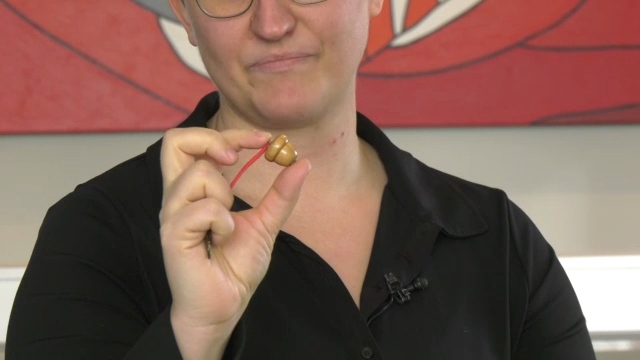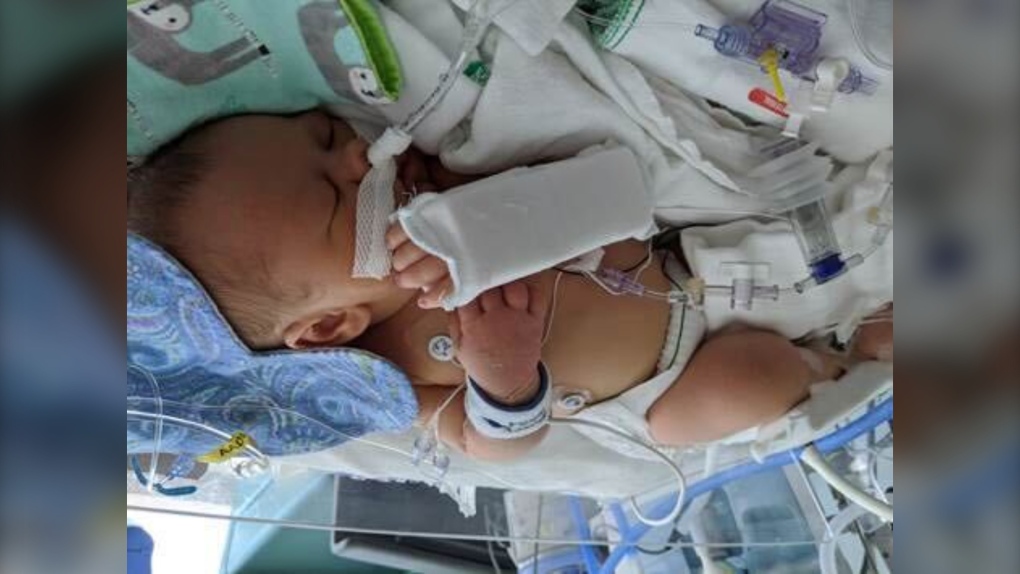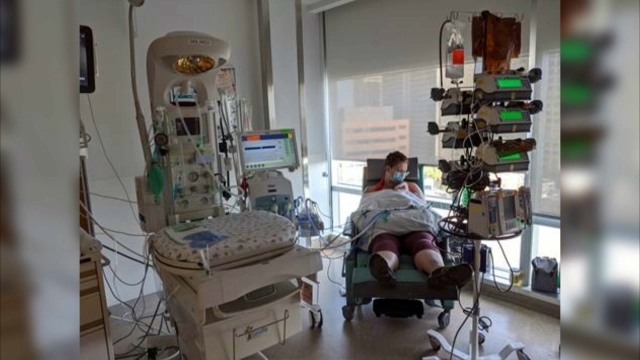'Even the playing field': New non-profit hopes to raise profile of congenital heart defects
An Alberta couple wants to ensure parents-to-be get the full picture when getting a sonogram after their son was born with a severe heart defect.
Amy Porter and her wife Sam learned in 2020 they would be expecting a baby boy. At 20 weeks, Amy's anatomy scan showed that her son, Artie, was looking healthy.
That scan missed a serious heart condition called transposition of the great arteries, where the position of the two main arteries carrying blood from the heart is switched, preventing proper flow.
Eight weeks later, Amy underwent an ultrasound as a precaution since doctors were concerned she measured large. That scan made a life-saving discovery.
"We found out that he had a very critical heart defect," Amy told CTV News Edmonton.
"I could tell that we were looking at his heart, but I didn't know why. And they are not legally allowed to tell you anything about your scans," she added. "So I kind of just had that in the back of my head."
She later found out from her obstetrician that she was being referred to specialists who would help her deliver her son.
"The only other information she gave was don't Google it," Amy said with a laugh. "I am a research nerd, and I find research very comforting. I feel if I know everything about something, then I won't be surprised."
Amy found out that her son's form of congenital heart defect was repairable through open-heart surgery and that the procedure had a success rate of 96 per cent.
 Amy holds a small keychain that represents the size of a heart at 20 weeks (CTV News Edmonton/Alison MacKinnon).
Amy holds a small keychain that represents the size of a heart at 20 weeks (CTV News Edmonton/Alison MacKinnon).
That diagnosis meant delivery in their chosen hospital was no longer an option. Her labour would be induced at the Royal Alexandra Hospital, only for Artie to be then rushed by specialized ambulance to the Stollery Children's Hospital.
"I got to see him at the end of the delivery table," Amy recounted. "I gave him a little rub on the head and let him go."
Amy had to stay as she recovered from her delivery. Her wife Sam accompanied Artie and saw him undergo life-saving heart surgery.
"That's when his oxygen saturation dropped, and that's when they had to intervene with a balloon septostomy to open up a hole between his top two atria," Sam explained.
"I was able to tell Amy that things were getting better," she added.
Artie is now a healthy and active two-year-old who loves to play with his older sister Frankie. He will have precautionary cardiology appointments annually to check on his heart.
 Artie rests after his surgery in 2020 (Supplied).
Artie rests after his surgery in 2020 (Supplied).
'THEY NEED A DIAGNOSIS AS EARLY AS POSSIBLE'
With the help of a pair of cardiologists, Amy has now started a new non-profit foundation to help increase awareness and the diagnosis rate of congenital heart defects.
"We're very grateful it was detected," Amy said. "But it was detected late. It should have been picked up at my 20-week anatomy scan."
 Artie was discharged after spending eight days in the hospital (Supplied).
Artie was discharged after spending eight days in the hospital (Supplied).
For Dr. Lisa Hornberger, that story is all too familiar. She works with Amy at the Tiny HeartsCan Foundation to support research and awareness of congenital heart defects.
"The biggest thing especially is having a diagnosis that's early enough in your pregnancy to know what's going on with your baby and get other tests to know what else is going on," Hornberger said.
"But also where there is a severe heart problem, [you have] to be delivered at the right place," she added.
According to the foundation, one in 100 kids will have a heart defect, which is also the most common congenital disease and the world's leading cause of infant mortality due to defect.
In Alberta, that means approximately 550 infants a year are born with a congenital heart defect, with research from the foundation suggesting half may not be detected before birth.
"They need a diagnosis as early as possible so that the doctors and the medical teams can be prepared to intervene right at that moment of birth," Amy said.
The foundation is also creating training for sonographers and hosting outreach sessions in rural parts of the province to educate health professionals on congenital heart defects. It hopes to become a national charity to further education programs beyond the province.
"These babies can be at risk of really severe outcomes in the first sort of minutes to days after birth," said Dr. Luke Eckersley, who also works with Tiny HeartsCan.
"Being on the right medications, having the right doctors, nurses, and right specialists around can make all the difference as far as their short- and long-term outcomes," he added.
"We just hope to even the playing field across the province, so everyone gets the best chance."
With files from CTV News Edmonton's Alison MacKinnon
CTVNews.ca Top Stories

NEW From yearning for a change to cost of living, why some Canadians have left or may leave the country
For some immigrants, their dreams of permanently settling in Canada have taken an unexpected twist.
Here are the ultraprocessed foods you most need to avoid, according to a 30-year study
Studies have shown that ultraprocessed foods can have a detrimental impact on health. But 30 years of research show they don’t all have the same impact.
NEW Capital gains tax change 'shortsighted' and 'sows division' business groups tell Freeland
Forging ahead with increasing Canada's capital gains inclusion rate 'sows division,' and is a 'shortsighted' way to improve the deficit, business groups are warning Finance Minister Chrystia Freeland.
Ontario man frustrated after $3,500 paving job leaves driveway in shambles
An Ontario man considering having his driveway paved received a quote from a company for $7,000, but then, another paver in the neighbourhood knocked on his door and offered half that rate.
Defence attacks Stormy Daniels' credibility as she returns to the stand in Trump's hush money trial
Stormy Daniels will return to the witness stand Thursday in Donald Trump's hush money trial as the defence tries to undermine the credibility of the porn actor's salacious testimony about their alleged sexual encounter and the money she was paid to keep quiet.
Police handcuff man trying to enter Drake's Toronto mansion
Toronto police say a man was taken into custody outside Drake's Bridle Path mansion Wednesday afternoon after he tried to gain access to the residence.
What is whooping cough and should Canadians be concerned as Europe declares outbreak?
There is currently a whooping cough epidemic in Europe, with 10 times as many cases compared to the previous two years. While an outbreak has not been declared nationwide in Canada, whooping cough is regularly detected in the country.
Florida deputies who fatally shot U.S. airman burst into wrong apartment, attorney says
Deputies responding to a disturbance call at a Florida apartment complex burst into the wrong unit and fatally shot a Black U.S. Air Force airman who was home alone when they saw he was armed with a gun, an attorney for the man's family said Wednesday.
Air Canada ranks near bottom on customer satisfaction: survey
Air Canada ranks below most other major North American airlines on customer satisfaction, with airfares a particular sore point, according to a new survey.































